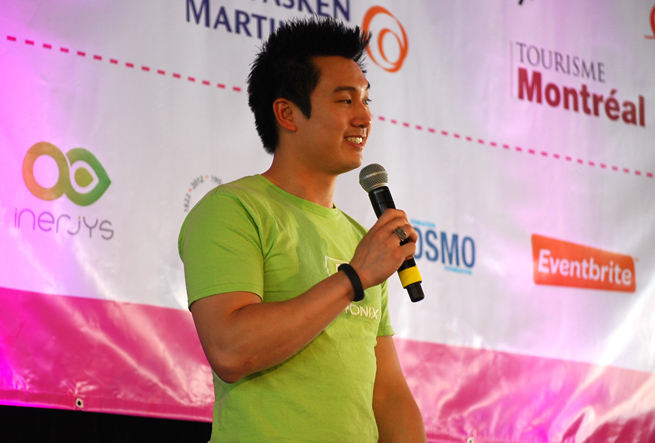Microsoft Kinect–based medical software startup Jintronix has won the $50,000 top prize at Montreal’s International Startup Festival.
[aditude-amp id="flyingcarpet" targeting='{"env":"staging","page_type":"article","post_id":489888,"post_type":"story","post_chan":"none","tags":null,"ai":false,"category":"none","all_categories":"business,games,","session":"A"}']Jintronix, a finalist for Microsoft’s TechStars-based Kinect Accelerator, creates Windows-based games that aim to make physical therapy and rehabilitation fun and afforable. The games utilize Microsoft’s Kinect motion-tracking hardware, and we handily talked to the company before their big win.
“Physical therapy has been the same for the past four decades, and there hasn’t been much change in the types of exercises that are available to patients,” Jintronix CEO Justin Tan told VentureBeat. “The patients aren’t adhering to their regiments either because of lack of access, it’s too expensive, or it’s just boring. Our system is changing that by getting them the care they need at home.”
AI Weekly
The must-read newsletter for AI and Big Data industry written by Khari Johnson, Kyle Wiggers, and Seth Colaner.
Included with VentureBeat Insider and VentureBeat VIP memberships.
Since starting work on Kinect-focused games in March, the startup has developed three games focused on different kinds of physical therapy, such as balancing your body and moving and stretching your arms. Ideally, the company hopes to incorporate other types of technology in tandem with Kinect to expand its tracking capabilities in the future.
Tan conceived of the startup during his final year at MIT, after his father suffered a stroke and saw problems with rehabilitation up close. “It’s a heartbreaking experience to see patients that need to get better and struggle with it because of the state of the health-care system,” Tan said. “We want to focus on helping patients get better and making it as simple as possible.”
Tan first’s creation at MIT a proof-of-concept for motion-based physical therapy that used a the motion-sensing controller from Nintendo’s Wii console, but the company is focuses on Kincect now. Tan decided to fully realize his idea after moving back to Montreal after school, and he now works with seven other employees on the software.
Tan founded Jintronix in 2010 and is in the process of raising a seed round.
The other ISF winners are:
[aditude-amp id="medium1" targeting='{"env":"staging","page_type":"article","post_id":489888,"post_type":"story","post_chan":"none","tags":null,"ai":false,"category":"none","all_categories":"business,games,","session":"A"}']
• Winner of Startup Stage Pitches: Openera
• Winner of Elevator Pitches: Bridge4Events.com
• Winner of the Teenagers’ Pick Award: From stage pitches: Storypanda / From tent pitches: Foodo
• Winner of the Grandmother’s Pick Award: From stage pitches: Gas Smart / From tent pitches: Jintronix
• Winner of FounderFuel Prize: Openera
VentureBeat's mission is to be a digital town square for technical decision-makers to gain knowledge about transformative enterprise technology and transact. Learn More
